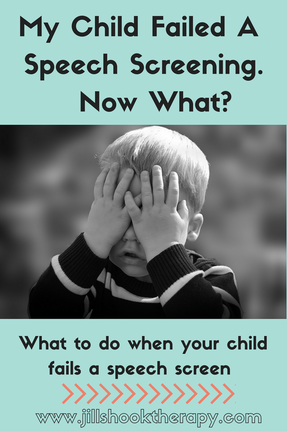|
So school has been in session for a little while. Things are going well- your child is having a good time, you haven't forgotten anyone's lunch, and you've gotten them to school (mostly) on time every day! Then one day your child comes home with a form that says they failed their speech and language screening. It hits you out of the blue- your child isn't doing as well in school as you'd hoped. You have so many questions- Does this mean they are dumb? Did I do something wrong in raising them? Where do I go from here?
Don't worry, I am here to explain the process of speech and language screening in schools. I have worked in schools for many years, and the screening process is similar across most districts.
What is a Speech and Language Screening?
A speech and language screening is a quick, non-invasive test that determines if further evaluation is necessary to identify any issues with speech or language. Generally, a child is shown pictures and asked to label them or talk about them, and then is asked to say certain words to make sure they can say the sounds in them. It is not a high-stress environment. Many of the preschool children I screen think we're playing! Keep in mind that your child was most likely not "singled out" to be screened. In most districts, Pittsburgh included, all newly enrolled preschoolers are screened for hearing, speech, and language. This is done to ensure that no issues go unnoticed and no children "fall through the cracks" early in their school careers. How can a Speech and Language Screening help my child? Screenings can help determine if there are any issues that need to be addressed before they become bigger problems for your child, for example, speech sound (articulation) disorders. In general, the earlier an issue is addressed, the better it is for everyone involved. What do I do after I get the results? Generally, you will receive a form that says that a screening was performed and that your child did not pass in the area of "speech" or "language". It should also say something about the speech-language pathologist (speech therapist) contacting you to set up a time to talk about the screening and the next steps. The therapist should call you to discuss the results. They might also send home a form that gives them permission to evaluate your child more fully to really see what areas or speech or language they may be struggling in, or to have another education professional evaluate them as well. You have the choice to agree or to refuse to let your child be evaluated. You can also mention any concerns you may have about your child's speech or language and ask the therapist to pay special attention to those areas when evaluating your child. After the evaluation, the speech therapist will arrange a time for you to meet and discuss the results with her and with your child's teacher. If your child qualifies for services, a plan to serve them and help them succeed will be created. If they do not qualify, the therapist will give you recommendations about what to do to help your child at home. At any point, you can ask the therapist any questions you may have about the process. Do you have any questions about your child's speech or language, or about a screening at school? Call or email me! Happy Learning! Comments are closed.
|
About MEI'm Jill! I love to create and blog about fun, evidence-based resources that make the lives of parents and busy SLPs easier.
�
Archives
February 2018
Categories
All
|



 RSS Feed
RSS Feed